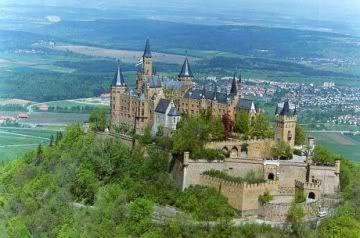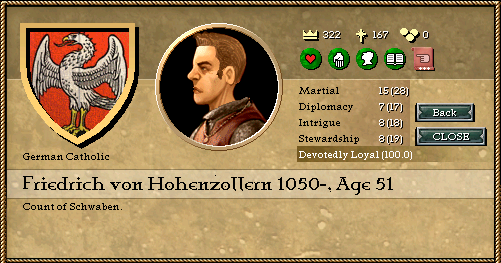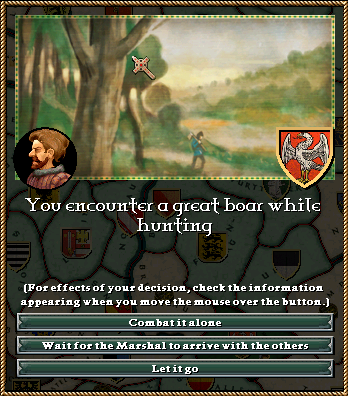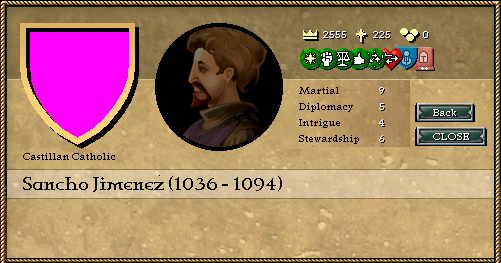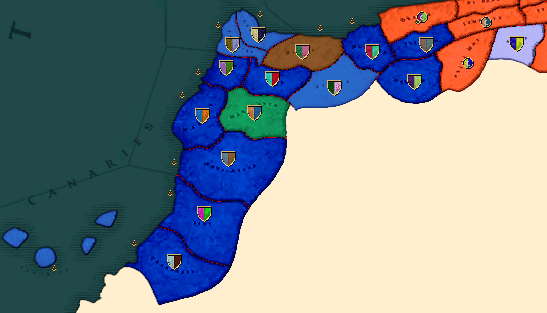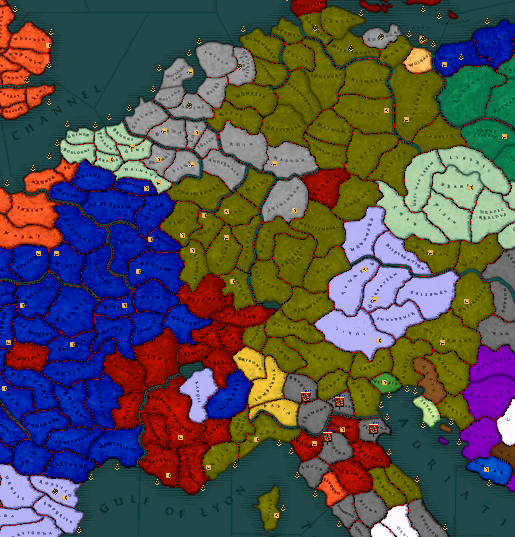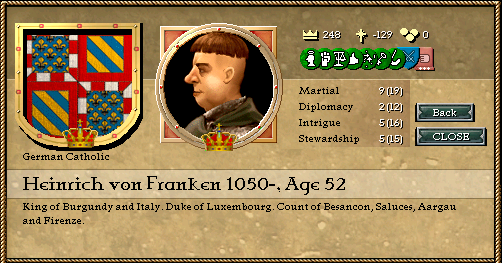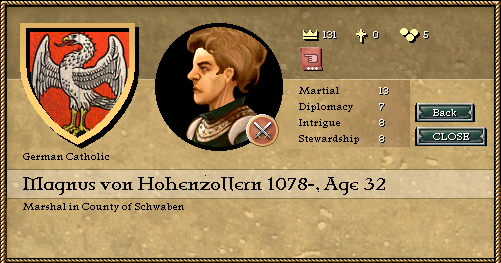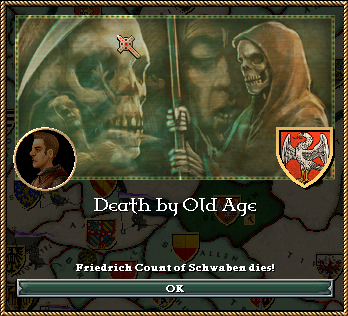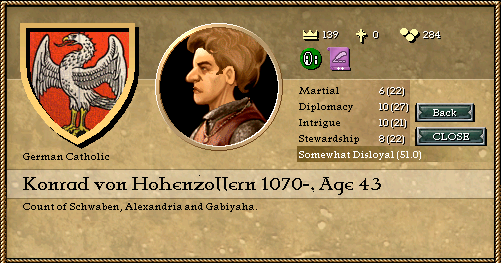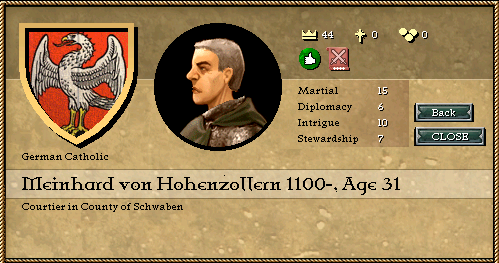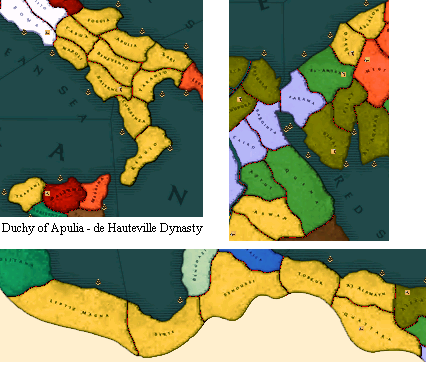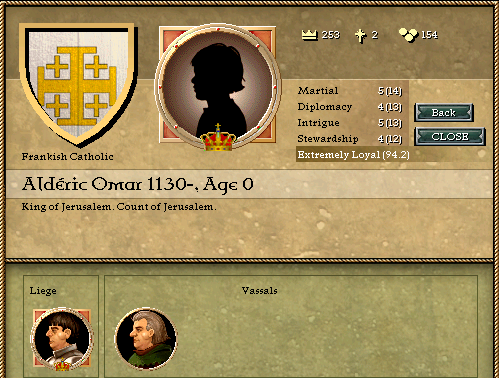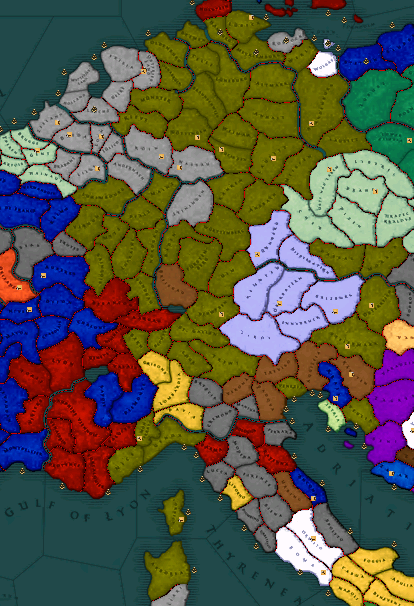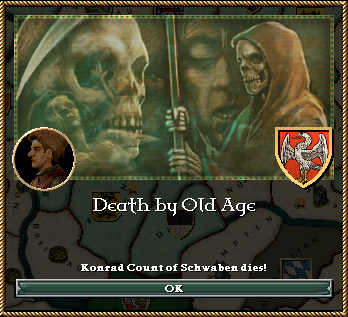Friedrich I
Born 1050 - Died 1114
Reigned 1061-1114
Friedirch was the only child of Burkhard I, being born in 1050 and inheriting lordship over the lands of Schwaben upon his father's death in 1061. For his day, he was known as a wise soldier, renowned for his training of his army, which made up for its meager size with exceptional skill. His honesty won the admiration of his people and during the course of his reign, calm was known throughout the lands under Friedrich.
Friedrich was a very loving husband, marrying Luitgard von Zähringen, the daughter of Berthold, then the Duke of Kärnten. They met as children many times as she'd occasionally go to her brother's lands in Breisgau to get away from the 'stuffy atmosphere' in her father's court as she'd call it. Many a time, Friedrich and Luitgard would row out into the Bodensee and enjoy each others company. This holy union would prove to be very plentiful as the couple would have 8 children, 4 sons and 4 daughters. This immense family is further proof of Friedrich's bedroom antics, the description of such exploits would make many a fair maiden blush!
The sons of Friedrich I:
1. Konrad (Born 1070 -): The heir to the lands of his father, Konrad was known for his selfish and gruff diplomatic style during his tenures as his father's chancellor.
2. Albrecht (Born 1071 -): Raised for a possible future as a Bishop if his father's lands grew, Albrecht grew to have a zealous regard on the issue of expanding the lands of the family. For this reason as well as the lack of expansion, he had Albrecht take up the role of his spymaster from time to time, instead of the Bishopric he was promised as a youth.
3. Emich (Born 1072 - Died 1099): Considered to be the least skilled of the four brothers, Emich's arbitrariness and zeal on the field of battle made him a worthy candidate as marshal for his father. In time though, Magnus would surpass him in this regard. Left with loads of free time and little attention, Emich's rash decision to go forth and face the boar alone that he came upon during a hunting trip, rather than wait for his brother Magnus and the rest of the hunting party may have been a cry for love and recognition. This decision would cost him his life.
4. Magnus (Born 1078 -): The only one of the four brothers who followed in his father's footsteps and went to the local army academy, Magnus would grow up and prove to nearly be his father's equal on the battlefield. His resourcefulness and quick thinking convinced his father to make him his marshal which would prove a wise decision in the future.
The tragic Emich, slain by a mighty boar
However, the story of Emich and the Boar does not end here. In later years, Nikolaus von Hohenzollern, son of Konrad and nephew of Emich, would come across that same boar in another hunting trip. Just like his uncle, Nikolaus decided he had something to prove and took on the boar alone. Some say his old uncle Emich came back to give him the needed strength as Nikolaus successfully slew the boar.
For most of his reign, Friedrich's options were limited due to being a lowly Count in the vast German Kingdom. He would lay claim to the lands of Trent and Padua, in hopes that a opportunity would arise for a future descendant. Although it was a quiet time in Schwaben, much was going on in the world.
In Spain, King Sancho Jimenez of Castille inherited the lands of the kingdoms of Leon and Aragon due to timely deaths in his family. Controlling a now unified and powerful kingdom, he would begin the Reconquestia and one by one, take out the Muslim Emirs that controlled Southern Iberia.
The beatified King Sancho Jimenez
Iberia shortly after Sancho's death
Sancho was not the only Christian King conquering Muslim lands during this time. In the western regions of North Africa, the kings of France, Scotland and England divided and conquered all the Muslim lands. However, the Counts they left to rule in their name did not always prove loyal as some became independent over the years.
These lands now belong to Christainity once again.
The mighty Byzantine Empire, the Rome of the East, has been able to maintain a fragile peace with the Seljuk Turks as they focused their sights westwards on the Kingdom of Croatia. Although the Croatian King still sits on his throne, his lands are much reduced.
And finally, we come to possibly the most important event during Friedrich's long reign, the German Civil War and its aftermath. After many years of mismanagement at the hands of King Heinrich von Franken, certain vassals of his decided enough was enough and declared war on the German King. The main antagonists on the rebel side were the Duchies of Toscana, Bavaria and Lower Lorraine and the Republic of Genoa. Friedrich himself, as well as his liege, were indifferent to the conflict and stayed out of it. While the German King focused on the rich lands of the Duchy of Toscana, the other rebel forces conquered the German crown lands one by one. Finally, peace was made with all except the Duchy of Toscana whose conflict with the house of von Franken was still ongoing at the death of Friedrich I. The Republic of Genoa came out on top as it was given the claim on the German throne, but since they viewed such a feudal system as backward, they created the Republic of Germany. With much reduced lands and a wounded pride, Heinrich von Franken was left as King of Burgundy and Italy.
Germany after the German Civil War
Alighiero, Consul of Germany
Heinrich III, King of Burgundy and Italy
As mentioned earlier, Friedrich I did not have many opportunities to do great deeds during most of his reign due to his meager position and resources. This however would soon change with the call from the Pope for a crusade to retake the city of Alexandria. Shortly after the call went out, the Republic of Venice foolishly decided to take on the entirety of the Fatamid Kingdom and ended up being conquered. Much time would pass before the next attempt by the now tiny Kingdom of Croatia. Taking advantage of the civil war going on within the Fatamid Kingdom, the Croatians successfully took the city of Alexandria and most of upper Egypt before the tables turned; just as the last Croatian lands in Egypt were being conquered however, the Republic of Germany decided it was time to launch its own crusade.
At first, Friedrich was wary of joining due to his fragile economic situation. However, a few months after the start of the crusade his liege, the Duke of Swabia, called upon Friedrich to do his Christian duty. More afraid of the backlash he'd face if he didn't march off for war, Friedrich mobilized his army of 1050 men and along with 600 men provided by his liege, made way for the city of Alexandria. Many months passed as the troops hunkered down in boats that had left the recently recaptured city of Venice before the troops landed. Expecting much resistance and prepared for defeat and death, Friedrich was surprised to see no Fatamid forces in sight. It was later found that these forces had their hands full with their ongoing civil war as well as the massive main German army taking lands in and around Damascus.
[Continued in next post]

